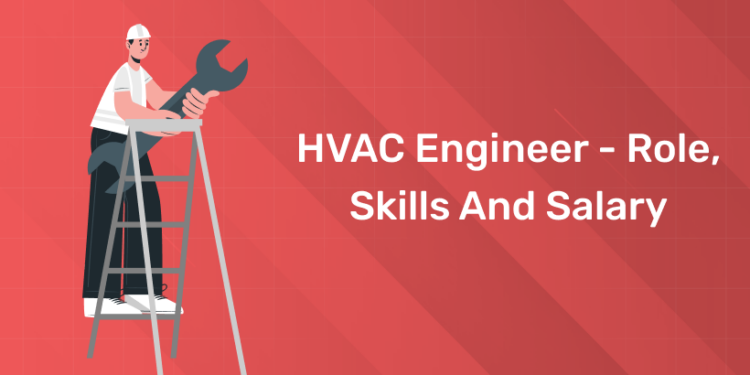Table of Contents
An HVAC (heating, ventilation, and air conditioning) engineer might pursue a number of career paths. You may finish an apprenticeship or a course at college. To choose which path of becoming an HVAC engineer is best for you, you should investigate these options.
Many businesses are more interested in candidates who are eager, willing to learn, and able to follow directions, even if some of these possibilities need qualifications. HVAC engineers are responsible for designing heating, ventilation and air conditioning systems for residential and commercial spaces like schools, apartment buildings, offices and factories.
Most require a bachelor’s degree in mechanical engineering or mechanical engineering technology at the very least. An overview of the HVAC engineering field may be seen in the chart below.
| Degree Required | Bachelor’s degree |
| Education Field of Study | Mechanical engineering |
| Key Skills | Creativity, problem-solving, mechanical skills |
| Voluntary Licensure | Professional engineering (PE) |
What Do HVAC Engineers Do?
Extensive planning is involved in the design of each new business or residential structure, including the operation of the plumbing, HVAC, and electrical systems. The task of determining how to operate heating, cooling, and ventilation systems within the constraints of the building’s blueprint falls to HVAC engineers. This entails coming up with inventive ways to optimize both efficiency and space. An HVAC engineer has to be well-versed in load calculations, construction methods, and local building codes in order to do this.
HVAC experts normally supervise the installation of the heating and cooling system once the designs are finished, and some are still on hand to handle any issues that may come up after construction.
Elevate your career with our comprehensive MEP Course! Get Free Demo Here!
Top 8 Job Responsibilities of an HVAC Engineer
- To ensure that the HVAC system is built safely and that maintenance is performed in compliance with safety guidelines
- To ensure that the inspection department has authorized the installation of HVAC duct fittings, kid water pipers, and accessories
- To ensure that the instruments needed for installing an HVAC system are accessible
- To ensure that every position needed for the installation—such as supervisor, pipe fitter, and duct fitter—is present, To begin installing the HVAC system
- To prepare paperwork and carry out an examination in order to install HVAC
- To conduct a site assessment in order to determine if the location is pertinent in light of the drawing and standards
- Must actively engage in weekly meetings with the project management team, manager, and supervisor in order to resolve difficulties at the site
- To give the site supervisor the HVAC shop drawing and the MEP coordination drawing.
HVAC engineer Qualifications:
• Bachelor’s degree in Mechanical Engineering or related field.
• 5+ years of experience in HVAC design and installation.
• Working knowledge of HVAC systems and components.
• Proficient in the use of CAD and other design software.
• Excellent communication and problem-solving skills.
• Ability to work independently and as part of a team.
• Ability to read and interpret blueprints and technical documents.
• Valid driver’s license with a clean driving record.
How much could you earn as a heating, ventilation and air conditioning (HVAC) engineer?
The expected salary for a HVAC engineer varies as you become more experienced.
- Newly trained HVAC engineers can earn in the region of £20,000
- Experienced HVAC engineers can earn up to £35,000
- Self-employed HVAC engineers set their own pay rates.*
Hours and salary depend on location, employer and any overtime you may do.
* Salaries have been collected from multiple industry sources
Elevate your career with our comprehensive MEP Course! Get Free Demo Here!
HVAC Engineer Career Prospects
There is plenty of options at different locations if they successfully complete the training. They may find employment as an individual consultant or as a general contractor, HVAC installation company for homes or businesses, architectural firm, engineering firm, government agency, or big corporation. Because these systems are required in all businesses and residences, whether new and old, people may also obtain employment with ease. HVAC engineers advance to senior positions or launch their own design and production companies after a few years of work experience.
Courses you can expect to take in both associate and bachelor’s degree programs include:
- HVAC system design: Learn how to design, install and troubleshoot HVAC systems.
- Load calculations: Use mathematical formulas to determine the heating and cooling needs of a building.
- Thermal comfort: Study how humans interact with their environment and how to keep them comfortable.
- Building energy systems: Learn how to design energy-efficient HVAC systems.
- Airflow and comfort principles: Understand how to move air throughout a given space and how it affects the comfort of building occupants.
- Psychometrics: Study how temperature, humidity and other atmospheric conditions affect human comfort.
- Ductwork design: Learn how to design and install ductwork in HVAC systems.
- Energy and electrical load computation: Understand how to determine the energy needs of a building.
What skills are important for HVAC engineers?
Some of the skills that are important for HVAC engineers include:
- Analyses and problem-solving: The role often requires an engineer to troubleshoot issues with existing systems and identify ways to improve them. They can analyze data to design efficient new systems.
- Communication: Effective communication with other members of the construction team and clients is essential. The ability to explain complex technical concepts in simple terms is important in the role.
- Organization: Good organizational skills enable the engineer to manage multiple projects simultaneously and keep accurate records of their work.
- Time management: Efficient time management skills help HVAC engineers meet deadlines, forecast time requirements and create effective schedules.
- Computer literacy: It’s important for many HVAC specialties to have proficiency in using CAD software and other software programs relevant to their industry. Familiarity with the applicable terms and concepts is essential.
Frequently Asked Questions
What is HVAC Full form?
HVAC full form is heating, ventilation, and air conditioning.
What is the highest pay for HVAC Engineers?
The highest pay for an HVAC Engineer is ₹717k / year as per reports.











